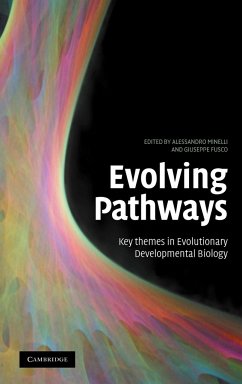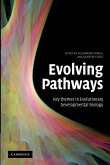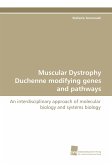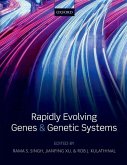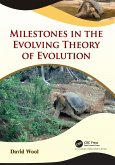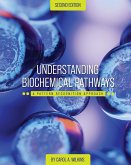Giuseppe FuscoKey Themes in Evolutionary Developmental Biology
Evolving Pathways
Key Themes in Evolutionary Developmental Biology
Herausgeber: Minelli, Alessandro; Fusco, Giuseppe
Giuseppe FuscoKey Themes in Evolutionary Developmental Biology
Evolving Pathways
Key Themes in Evolutionary Developmental Biology
Herausgeber: Minelli, Alessandro; Fusco, Giuseppe
- Gebundenes Buch
- Merkliste
- Auf die Merkliste
- Bewerten Bewerten
- Teilen
- Produkt teilen
- Produkterinnerung
- Produkterinnerung
This is an integrated overview of a diverse range of approaches to studying 'evo-devo', for researchers and graduate students.
Andere Kunden interessierten sich auch für
![Evolving Pathways Evolving Pathways]() Giuseppe FuscoEvolving Pathways64,99 €
Giuseppe FuscoEvolving Pathways64,99 €![Muscular Dystrophy Duchenne modifying genes and pathways Muscular Dystrophy Duchenne modifying genes and pathways]() Stefanie GrunwaldMuscular Dystrophy Duchenne modifying genes and pathways54,99 €
Stefanie GrunwaldMuscular Dystrophy Duchenne modifying genes and pathways54,99 €![Rapidly Evolving Genes and Genetic Systems Rapidly Evolving Genes and Genetic Systems]() Rapidly Evolving Genes and Genetic Systems236,99 €
Rapidly Evolving Genes and Genetic Systems236,99 €![Milestones in the Evolving Theory of Evolution Milestones in the Evolving Theory of Evolution]() David WoolMilestones in the Evolving Theory of Evolution251,99 €
David WoolMilestones in the Evolving Theory of Evolution251,99 €![Genetic variants in estrogen signaling pathways Genetic variants in estrogen signaling pathways]() Gemma FigtreeGenetic variants in estrogen signaling pathways53,99 €
Gemma FigtreeGenetic variants in estrogen signaling pathways53,99 €![Understanding Biochemical Pathways Understanding Biochemical Pathways]() Carol A. WilkinsUnderstanding Biochemical Pathways100,99 €
Carol A. WilkinsUnderstanding Biochemical Pathways100,99 €![Understanding Biochemical Pathways Understanding Biochemical Pathways]() Carol A. WilkinsUnderstanding Biochemical Pathways68,99 €
Carol A. WilkinsUnderstanding Biochemical Pathways68,99 €-
-
-
This is an integrated overview of a diverse range of approaches to studying 'evo-devo', for researchers and graduate students.
Hinweis: Dieser Artikel kann nur an eine deutsche Lieferadresse ausgeliefert werden.
Hinweis: Dieser Artikel kann nur an eine deutsche Lieferadresse ausgeliefert werden.
Produktdetails
- Produktdetails
- Verlag: Cambridge University Press
- Seitenzahl: 446
- Erscheinungstermin: 7. November 2012
- Englisch
- Abmessung: 235mm x 157mm x 28mm
- Gewicht: 792g
- ISBN-13: 9780521875004
- ISBN-10: 0521875005
- Artikelnr.: 26370370
- Herstellerkennzeichnung
- Libri GmbH
- Europaallee 1
- 36244 Bad Hersfeld
- gpsr@libri.de
- Verlag: Cambridge University Press
- Seitenzahl: 446
- Erscheinungstermin: 7. November 2012
- Englisch
- Abmessung: 235mm x 157mm x 28mm
- Gewicht: 792g
- ISBN-13: 9780521875004
- ISBN-10: 0521875005
- Artikelnr.: 26370370
- Herstellerkennzeichnung
- Libri GmbH
- Europaallee 1
- 36244 Bad Hersfeld
- gpsr@libri.de
Alessandro Minelli is currently Professor of Zoology at the University of Padova, Italy. An honorary fellow of the Royal Entomological Society, he was a founding member and vice-president of the European Society for Evolutionary Biology. He has served as president of the International Commission on Zoological Nomenclature, and is on the editorial board of multiple learned journals, including Evolution Development. He is the author of 'The Development of Animal Form' (2003).
Giuseppe Fusco is Assistant Professor of Zoology at the University of Padova, Italy. His main research work is in the morphological evolution and post-embryonic development of arthropods, with particular reference to the role of segmentation in the Chilopoda. The results of his work have been presented at many international congresses, including the European Society for Evolutionary Biology and the Society for Integrative and Comparative Biology.
Giuseppe Fusco is Assistant Professor of Zoology at the University of Padova, Italy. His main research work is in the morphological evolution and post-embryonic development of arthropods, with particular reference to the role of segmentation in the Chilopoda. The results of his work have been presented at many international congresses, including the European Society for Evolutionary Biology and the Society for Integrative and Comparative Biology.
Preface; Introduction: pathways of change; Part I. Thinking about Evolution
by Taking Development Seriously: 1. Evo-devo as a discipline Gerd B.
Müller; 2. Making evolutionary predictions about the structure of
development and morphology: beyond the neo-Darwinian and constraints
paradigms Isaac Salazar-Ciudad; 3. Conflicting hypotheses on the nature of
mega-evolution Wallace Arthur; 4. Prospects of evo-devo for linking pattern
and process in the evolution of morphospace Paul M. Brakefield; 5. The
molecular biology underlying developmental evolution Claudio R. Alonso; 6.
Evo-devo's identity: from model organisms to developmental types Ronald A.
Jenner; Part II. Evo-Devo - Materials and Methods: 7. A pragmatic approach
for selecting evo-devo model species in Amniotes Athanasia Tzika and Michel
C. Milinkovitch; 8. On comparisons and causes in evolutionary developmental
biology Gerhard Scholtz; 9. Evolution and development: towards a synthesis
of macro- and micro-evolution with ecology Hans Zauner and Ralf J. Sommer;
10. When is a hox gene not a hox gene? The importance of gene nomenclature
David E. K. Ferrier; 11. Plants are used to having identity crises Rolf
Rutishauser, Valentin Grob and Evelin Pfeifer; Part III. Evolving
Diversity: 12. Unravelling body-plan and axial evolution in the bilateria
with molecular phylogenetic markers Jaume Baguñà, Pere Martinez, Jordi Paps
and Marta Riutort; 13. Are transposition events at the origin of the
bilaterian hox complexes? Jean S. Deutsch and Philippe Lopez; 14. Many
roads lead to Rome: different ways to construct a nematode Einhard
Schierenberg and Jens Schulze; 15. Basal Euarthropod development: a
fossil-based perspective Nigel C. Hughes, Joachim Haug and Dieter Waloszek;
16. Developmental transitions during the evolution of plant form Jane A.
Langdale and C. Jill Harrison; Part IV. Evolving Body Features: 17.
Urbisexuality: the evolution of bilaterian germ cell specification and
reproductive systems Cassandra G. M. Extavour; 18. Thoughts and
speculations on the ancestral arthropod segmentation pathway Ariel D.
Chipman; 19. Evolution of neurogenesis in arthropods Angelika Stollewerk;
20. Arthropod appendages: a prime example for the evolution of
morphological diversity and innovation Nikola-Michael Prpic and Wim G. M.
Damen; 21. Ontogeny of the spiralian brain Claus Nielsen.
by Taking Development Seriously: 1. Evo-devo as a discipline Gerd B.
Müller; 2. Making evolutionary predictions about the structure of
development and morphology: beyond the neo-Darwinian and constraints
paradigms Isaac Salazar-Ciudad; 3. Conflicting hypotheses on the nature of
mega-evolution Wallace Arthur; 4. Prospects of evo-devo for linking pattern
and process in the evolution of morphospace Paul M. Brakefield; 5. The
molecular biology underlying developmental evolution Claudio R. Alonso; 6.
Evo-devo's identity: from model organisms to developmental types Ronald A.
Jenner; Part II. Evo-Devo - Materials and Methods: 7. A pragmatic approach
for selecting evo-devo model species in Amniotes Athanasia Tzika and Michel
C. Milinkovitch; 8. On comparisons and causes in evolutionary developmental
biology Gerhard Scholtz; 9. Evolution and development: towards a synthesis
of macro- and micro-evolution with ecology Hans Zauner and Ralf J. Sommer;
10. When is a hox gene not a hox gene? The importance of gene nomenclature
David E. K. Ferrier; 11. Plants are used to having identity crises Rolf
Rutishauser, Valentin Grob and Evelin Pfeifer; Part III. Evolving
Diversity: 12. Unravelling body-plan and axial evolution in the bilateria
with molecular phylogenetic markers Jaume Baguñà, Pere Martinez, Jordi Paps
and Marta Riutort; 13. Are transposition events at the origin of the
bilaterian hox complexes? Jean S. Deutsch and Philippe Lopez; 14. Many
roads lead to Rome: different ways to construct a nematode Einhard
Schierenberg and Jens Schulze; 15. Basal Euarthropod development: a
fossil-based perspective Nigel C. Hughes, Joachim Haug and Dieter Waloszek;
16. Developmental transitions during the evolution of plant form Jane A.
Langdale and C. Jill Harrison; Part IV. Evolving Body Features: 17.
Urbisexuality: the evolution of bilaterian germ cell specification and
reproductive systems Cassandra G. M. Extavour; 18. Thoughts and
speculations on the ancestral arthropod segmentation pathway Ariel D.
Chipman; 19. Evolution of neurogenesis in arthropods Angelika Stollewerk;
20. Arthropod appendages: a prime example for the evolution of
morphological diversity and innovation Nikola-Michael Prpic and Wim G. M.
Damen; 21. Ontogeny of the spiralian brain Claus Nielsen.
Preface; Introduction: pathways of change; Part I. Thinking about Evolution
by Taking Development Seriously: 1. Evo-devo as a discipline Gerd B.
Müller; 2. Making evolutionary predictions about the structure of
development and morphology: beyond the neo-Darwinian and constraints
paradigms Isaac Salazar-Ciudad; 3. Conflicting hypotheses on the nature of
mega-evolution Wallace Arthur; 4. Prospects of evo-devo for linking pattern
and process in the evolution of morphospace Paul M. Brakefield; 5. The
molecular biology underlying developmental evolution Claudio R. Alonso; 6.
Evo-devo's identity: from model organisms to developmental types Ronald A.
Jenner; Part II. Evo-Devo - Materials and Methods: 7. A pragmatic approach
for selecting evo-devo model species in Amniotes Athanasia Tzika and Michel
C. Milinkovitch; 8. On comparisons and causes in evolutionary developmental
biology Gerhard Scholtz; 9. Evolution and development: towards a synthesis
of macro- and micro-evolution with ecology Hans Zauner and Ralf J. Sommer;
10. When is a hox gene not a hox gene? The importance of gene nomenclature
David E. K. Ferrier; 11. Plants are used to having identity crises Rolf
Rutishauser, Valentin Grob and Evelin Pfeifer; Part III. Evolving
Diversity: 12. Unravelling body-plan and axial evolution in the bilateria
with molecular phylogenetic markers Jaume Baguñà, Pere Martinez, Jordi Paps
and Marta Riutort; 13. Are transposition events at the origin of the
bilaterian hox complexes? Jean S. Deutsch and Philippe Lopez; 14. Many
roads lead to Rome: different ways to construct a nematode Einhard
Schierenberg and Jens Schulze; 15. Basal Euarthropod development: a
fossil-based perspective Nigel C. Hughes, Joachim Haug and Dieter Waloszek;
16. Developmental transitions during the evolution of plant form Jane A.
Langdale and C. Jill Harrison; Part IV. Evolving Body Features: 17.
Urbisexuality: the evolution of bilaterian germ cell specification and
reproductive systems Cassandra G. M. Extavour; 18. Thoughts and
speculations on the ancestral arthropod segmentation pathway Ariel D.
Chipman; 19. Evolution of neurogenesis in arthropods Angelika Stollewerk;
20. Arthropod appendages: a prime example for the evolution of
morphological diversity and innovation Nikola-Michael Prpic and Wim G. M.
Damen; 21. Ontogeny of the spiralian brain Claus Nielsen.
by Taking Development Seriously: 1. Evo-devo as a discipline Gerd B.
Müller; 2. Making evolutionary predictions about the structure of
development and morphology: beyond the neo-Darwinian and constraints
paradigms Isaac Salazar-Ciudad; 3. Conflicting hypotheses on the nature of
mega-evolution Wallace Arthur; 4. Prospects of evo-devo for linking pattern
and process in the evolution of morphospace Paul M. Brakefield; 5. The
molecular biology underlying developmental evolution Claudio R. Alonso; 6.
Evo-devo's identity: from model organisms to developmental types Ronald A.
Jenner; Part II. Evo-Devo - Materials and Methods: 7. A pragmatic approach
for selecting evo-devo model species in Amniotes Athanasia Tzika and Michel
C. Milinkovitch; 8. On comparisons and causes in evolutionary developmental
biology Gerhard Scholtz; 9. Evolution and development: towards a synthesis
of macro- and micro-evolution with ecology Hans Zauner and Ralf J. Sommer;
10. When is a hox gene not a hox gene? The importance of gene nomenclature
David E. K. Ferrier; 11. Plants are used to having identity crises Rolf
Rutishauser, Valentin Grob and Evelin Pfeifer; Part III. Evolving
Diversity: 12. Unravelling body-plan and axial evolution in the bilateria
with molecular phylogenetic markers Jaume Baguñà, Pere Martinez, Jordi Paps
and Marta Riutort; 13. Are transposition events at the origin of the
bilaterian hox complexes? Jean S. Deutsch and Philippe Lopez; 14. Many
roads lead to Rome: different ways to construct a nematode Einhard
Schierenberg and Jens Schulze; 15. Basal Euarthropod development: a
fossil-based perspective Nigel C. Hughes, Joachim Haug and Dieter Waloszek;
16. Developmental transitions during the evolution of plant form Jane A.
Langdale and C. Jill Harrison; Part IV. Evolving Body Features: 17.
Urbisexuality: the evolution of bilaterian germ cell specification and
reproductive systems Cassandra G. M. Extavour; 18. Thoughts and
speculations on the ancestral arthropod segmentation pathway Ariel D.
Chipman; 19. Evolution of neurogenesis in arthropods Angelika Stollewerk;
20. Arthropod appendages: a prime example for the evolution of
morphological diversity and innovation Nikola-Michael Prpic and Wim G. M.
Damen; 21. Ontogeny of the spiralian brain Claus Nielsen.

